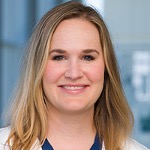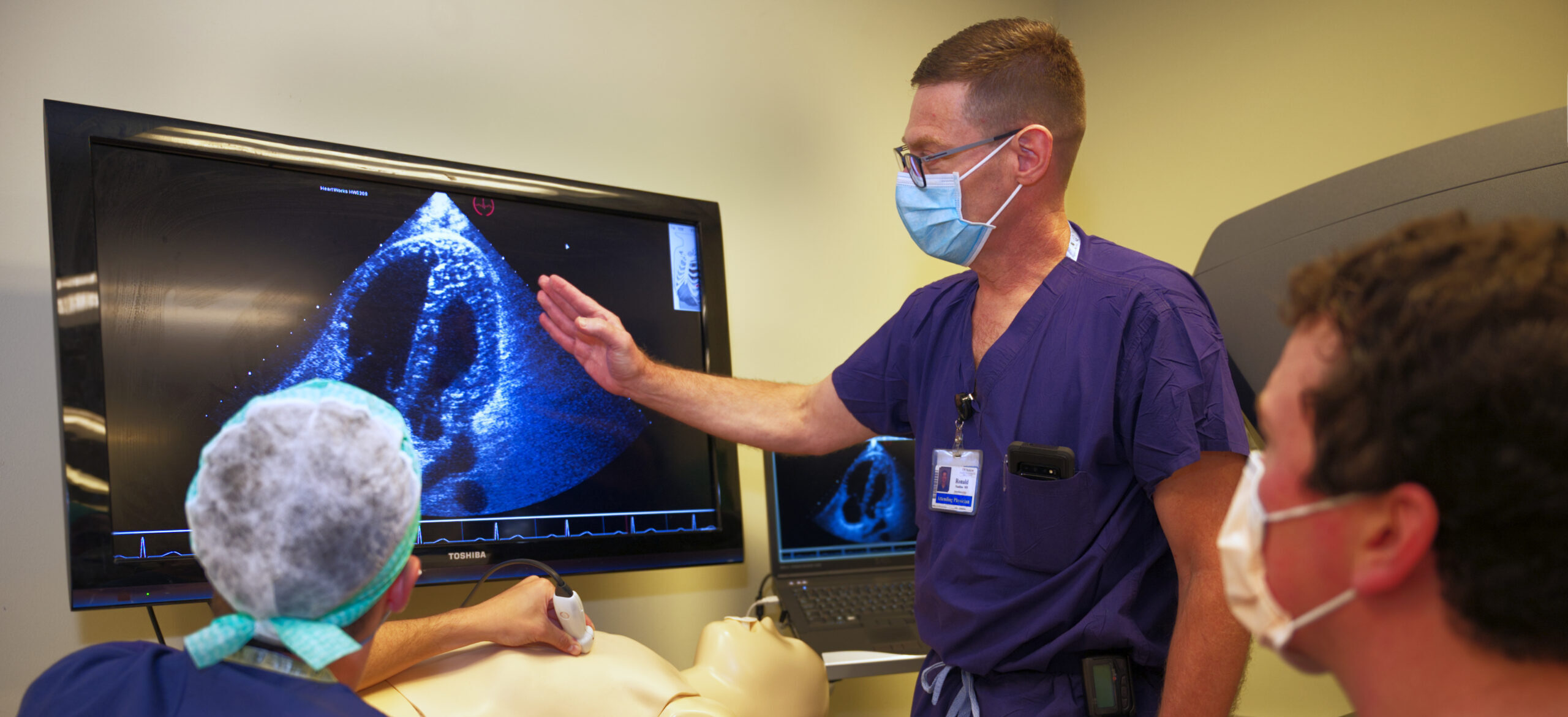About the Critical Care Medicine Fellowship
The Critical Care Fellowship Training Program is a one-year, ACGME-accredited program administered by the UW Department of Anesthesiology & Pain Medicine. Completion of this fellowship allows graduates to sit for the ABA certification exam. We accept graduates of residency programs in multiple disciplines including medicine, anesthesiology, surgery, obstetrics and gynecology and emergency medicine, and we select candidates based on their preparedness and ability to benefit from the program. We also offer a two-year program for graduates from emergency medicine residencies which leads to certification through the American College of Emergency Physicians.
In addition to our one- and two-year programs, we also offer an innovative five-year combined Anesthesiology and Critical Care Medicine program that confers ABA board eligibility if successfully completed. The first three years of training parallel those of trainees in the “conventional” anesthesiology residency track and include a total of five months of intensive care unit rotations. The last two years of training integrate 12 months of advanced critical care medicine at the fellow level with conventional anesthesia rotations and electives. The advanced critical care rotations are jointly administered with the Department of Medicine and are generally identical to those offered through the conventional one-year Critical Care Medicine Fellowship.
Education
In addition to ongoing clinical education, we offer a variety of structured educational opportunities, including:
- The Critical Care Division’s quarterly journal club for faculty, fellows, and combined program trainees.
- The Pulmonary Division’s weekly chest conference – a CPC-type format where fellows present teaching cases for attendings to discuss, followed by a didactic session.
- Rotation-specific didactics for each clinical rotation.
- A weekly multidisciplinary critical care journal club at Harborview Medical Center.
- An extensive array of research-based journal clubs and conferences made available through the fellowship.
Clinical experience
Our fellows rotate through a broad mix of ICUs within the UW system in a schedule that is integrated with the Pulmonary Critical Care Fellowship. The UW APM Critical Care Division includes 15 faculty who are trained in critical care medicine and contribute to the education of critical care fellows.
UW Medical Center – Montlake ICU services
- The Medical ICU Service cares for a variety of complex patients. With oversight by pulmonary and critical care faculty, our fellows guide a team of interns and internal medicine R2s, and take and triage calls for outside transfers from throughout the Pacific Northwest.
- The Surgical ICU Service cares for post-operative surgical patients from general surgery, neurosurgery, ENT, urology, plastics, orthopedics, liver transplant and some obstetrics patients requiring ICU stays. The fellow oversees a group of house staff from anesthesiology, surgery and emergency medicine. Critical care faculty on this service are from general surgery, anesthesiology and pulmonary critical care.
- The Cardiothoracic ICU Service serves all cardiac and thoracic surgical patients at UW Medical Center – Montlake. Our fellows are integral in managing the complex pathophysiology associated with these cases, leading a multidisciplinary team of surgery house staff, acute care nurse practitioners, physician’s assistants, pharmacists, and dietitians. The patient population consists of a robust general cardiac and thoracic experience, one of the world’s most active lung transplantation programs, a large cardiac transplantation program, and a variety of mechanical circulatory support devices including extracorporeal life support and ventricular assist devices.
- The Heme-Onc ICU serves bone marrow transplant and solid organ malignancy patients requiring ICU care. Here, our fellows work one-on-one with a pulmonary critical care attending in a co-management role with the hematology/oncology teams. The Heme-Onc ICU allows our fellows to work with a unique patient population and become facile with bronchoscopy as a tool for evaluating immunocompromised patients.
Harborview Medical Center ICU services
The only level-one trauma center in the WWAMI (Washington, Wyoming, Alaska, Montana, and Idaho) region, Harborview is owned by King County and managed by the University of Washington. Our fellows rotate on three services at Harborview:
- The Neurocritical Care Service is directed by the Department of Anesthesiology & Pain Medicine and cares for neurosurgical trauma patients with isolated spine and head injuries and patients with a variety of neurovascular problems, such as subarachnoid hemorrhage. Our fellows work with house staff from anesthesiology, emergency medicine, and neurosurgery and faculty from Anesthesiology and pulmonary critical care.
- The Trauma/Surgical ICU Service manages a large volume of trauma patients from the WWAMI region as well as general, vascular, and thoracic surgical patients in a “closed” ICU model. Our fellows work with anesthesiology and surgery residents and anesthesiology, pulmonary critical care, and trauma surgery critical care faculty.
- The MICU Service cares for critically ill patients from the WWAMI region. Our fellows work with Internal Medicine residents and Pulmonary Critical Care faculty.
VA Puget Sound Health Care System ICU services
- Directed by the Anesthesiology & Pain Medicine Department, the Surgical ICU Service cares for a variety of postoperative patients including post-cardiac surgery patients. Our fellows work with anesthesiology and surgery faculty and residents.
- The MICU Service cares for critically-ill veterans from the surrounding area. Our fellows work with internal medicine residents and pulmonary critical care faculty.
Electives
In addition to nine months of core ICU rotations, we offer a wide array of electives, including radiology, cardiology and echocardiography, nephrology, infectious disease, mechanical circulatory support, critical care ultrasound, and independent study.
Research opportunities
The University of Washington provides a vibrant environment for interdisciplinary biomedical research. The Anesthesiology & Pain Medicine, Medicine, and Surgery Departments all offer opportunities for research in basic science and clinical aspects of critical care and related fields. Collaboration among departments is common and provides for a rich intellectual atmosphere.
Harborview Medical Center and the University of Washington have an illustrious history of leadership in research in critical care medicine. The Critical Care Division is actively involved in outcomes-based research at Harborview, providing opportunities for critical care fellows to gain exposure to clinical research. Several opportunities exist for trainees interested in more in-depth research training with the intent to pursue an academic career. We offer a two-year, NIH-funded research fellowship in basic science or clinical research for trainees interested in focused research training. Some of our current research faculty have started their research careers via this mechanism following their clinical training in critical care.
Please refer to UW GME for updated stipend information, insurance and retirement benefits, policies, procedures, and other available resources.
Financial support
Annual Stipend: The UW Critical Care Fellowship salary is based on the UW GME schedule and may change from year to year.
Academic Allowance: Subject to available funding, fellows will receive an academic allowance each academic year as “all inclusive” support for their general expenses incurred during their time training.
PTO and leave
Please refer to the UW Resident and Fellow Physician Union – Northwest Contract for institutional PTO and leave allowance, and note that all leave of absence during training is subject to policies set by the American Board of Anesthesiology, which states: “The total of any and all absences during a subspecialty fellowship may not exceed the equivalent of 20 working days (four weeks) per year. Attendance at scientific meetings, not to exceed five working days during the year of training, shall be considered part of the training program. Absences in excess of those specified will require lengthening of the total training time to the extent of the additional absence.”
Program Director: Ronald Pauldine, MD, FCCM
Associate Program Director: Vanessa Lin, DO
Program Administrator: Miranda Laws
See a complete list of our critical care medicine faculty and fellows.
Eligibility
Graduates of ACGME accredited residency programs in anesthesiology, emergency medicine, obstetrics, general surgery and surgical sub-specialties are invited to apply to our program.
Applicants must meet the following qualifications to be eligible for appointment to an ACGME accredited program:
All required clinical education for entry into ACGME accredited fellowship programs must be completed in an ACGME-accredited residency program, an AOA-approved residency program, a program with ACGME International (ACGME-I) Advanced Specialty Accreditation, or in a Royal College of Physicians and Surgeons of Canada (RCPSC)-accredited or College of Family Physicians of Canada (CFPC)-accredited residency program located in Canada. [CPR III.A.1.] The program must receive verification of each entering fellow’s level of competence in the required field, upon matriculation, using ACGME, ACGME-I, or CanMEDS Milestones evaluations from the core residency program (CPR III.A.1.a). Exceptions to the fellowship eligibility requirements are outlined the Pain Fellowship Eligibility and Selection Policy.
Candidates must ensure they are eligible for a Washington State provider license, be authorized to work in the United States at the time of appointment and meet applicable essential abilities requirements of the program.
The University of Washington is committed to fostering an inclusive, respectful and welcoming community for all. As an equal opportunity employer, the University considers applicants for employment without regard to race, color, creed, religion, national origin, citizenship, sex, pregnancy, age, marital status, sexual orientation, gender identity or expression, genetic information, disability, or veteran status consistent with UW Executive Order No. 81.
SF Match
Our program participates in the nationwide Critical Care Anesthesiology Fellowship Match organized by SF Match.
SF Match provides a Centralized Application Service for critical care anesthesiology fellowships, where applicants must complete an online application form and submit three (3) letters of recommendation. Instructions can be found on the SF Match website.
Application documents
In addition to SF Match requirements, applicants must also submit these supporting documents directly to our program:
- Official medical or osteopathic school transcript sent directly to us from your school
- ABA BASIC Examination status
Please send completed applications and/or questions to Miranda Laws at accmfellowship@uw.edu.
Interviews
All interviews for UW GME training positions will continue to be conducted remotely through Zoom or another appropriate video conferencing platform until further notice per UW GME administration policy. Interview dates will be provided upon invitation.
To learn more about life and training in Seattle, visit our GME’s website for Prospective Residents and Fellows.
Hear from our fellowship graduates.
Kim Silka, MD | 2019-2020
I’m grateful for the exposure to the vast array of ICUs that the University of Washington’s fellowship granted me. If I hadn’t had such a broad exposure to all types of critical care, I would not be prepared for this kind of career, and my critical care group would not have been as motivated to hire me. I look forward to continuing to represent the anesthesia/critical care community in the private practice sphere and continuing to build on the solid critical care foundation the UW gave me.
 Mike Holmes, MD | 2017-2018
Mike Holmes, MD | 2017-2018
I came to Seattle for intern year in 2013 and still haven’t left. I currently work at Swedish Cherry Hill, the highest volume cardiac surgery center in the city, doing half cardiac anesthesia and half cardiovascular ICU. My critical care training at UW prepared me quite well for this job. The well-rounded mix of anesthesiologists, pulmonologists, and surgeons practicing critical care in the UWMC system ensures an adequate base of knowledge throughout the broad field, and this highly multidisciplinary training had me entering practice with comfort taking care of medical and surgical patients alike.
 Kristina Goff, MD | 2014-2015
Kristina Goff, MD | 2014-2015
The training I received at UW uniquely positioned me to be a leader in collaborative ICU medicine at my institution, University of Texas Southwestern Medical Center. By learning side by side with fellows from my own specialty, as well as Pulmonary Medicine and Trauma Surgery/Critical Care, I came to understand the different strengths each group brings to the table. I had the opportunity to be mentored by faculty members from a variety of backgrounds and to participate in the management of a broad spectrum of critically ill patients. I left my fellowship training feeling well-prepared to work independently in both the ICU and the OR, and can’t say enough about how much I value the experience I had at UW and the relationships that developed as a result of my time there. I am now the current Medical Director of our Surgical Intensive Care Unit at Clements University Hospital, and am the Physician Liaison for a busy in-situ simulation program working to improve team dynamics and clinical processes throughout our ICUs and other patient care areas.
Joseph Tonna, MD | 2013-2014
Training in critical care medicine at the University of Washington has been fundamental to my career. Among the best programs in world for critical care training, UW deserves special recognition. UW is one of the oldest and most respected programs in CCM, it has embraced the multidisciplinary approach of critical care since the beginning. As an emergency physician, UW was particularly appealing to me, because it was one of the programs that accepted emergency physicians well before there was either a boarding pathway, or general acceptance of emergency physicians in critical care.
I am now a Medical Director of the Cardiovascular ICU at the University of Utah, the section head for Critical Care Medicine in the Division of Cardiothoracic Surgery, an Associate Director of ECMO and an NIH funded researcher.
 Vipul Shah | 2012-2013
Vipul Shah | 2012-2013
Deciding on UW critical care for my fellowship was probably one of the best career decisions I have made. I moved to Seattle from Boston, where I trained in anesthesia at Beth Israel Deaconess Medical Center. The aspects of the UW fellowship that I liked the most were the faculty and their commitment to quality care and a great fellows experience. I also really appreciated the interdisciplinary experience of training with medicine and surgical attendings, from which I feel I became a much more well-rounded critical care physician. We interacted regularly with our pulmonary/critical care and surgical critical care colleagues and these interactions still influence how I practice today. My echo elective at the VA was foundational for me as it gave me skills that were very marketable and immediately applicable to my patients. We had a close fellow cohort and UW fostered that sense of camaraderie, and the anesthesia critical care attendings were very invested in our success.


